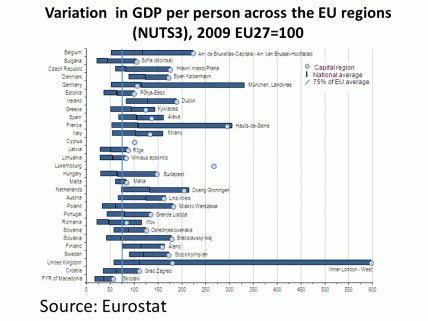The UK economy is geographically fractured with areas of prosperity and areas of deprivation. Nick Clegg will tell the City of London (some irony there) that the UK economy needs major rebalancing to shift its focus away from London. And he is right.
The State of the UK Regions – ‘I agree with Nick’ part 1
There are significant regional disparities in the UK economy – and this is a major problem, not simply because of equity but also because of efficiency and national economic performance – raising the economic performance of lagging regions would raise the overall growth of the economy. Some picture of the scale of the problem is shown in the chart below. London’s economic performance significantly outstrips the other regions of the UK – in 2011, London’s output per person was nearly 70% higher than the UK average and more than 130% greater than the least productive region (Wales). Furthermore, the extent of regional disparities has been increasing consistently since 1980 – under Conservative, Labour and Coalition Governments.
The Dynamics of Regional Growth – ‘I agree with Nick’ part 2
Nick Clegg argues that globalisation and the decline of heavy industry in the UK has played a part in the decline of the regions. The dynamics of economic growth (when we had some) led to regional disparities through a process of cumulative causation – fast growing regions (particularly London) attracted capital and skilled labour, further accelerating growth; whereas, slow growing regions lost capital and skilled labour, acting as a constraint on growth. Unfortunately, the dynamics of austerity, have not put this process into reverse – although the financial crisis hit London and the ‘City’; the period of recession and fiscal tightening have particularly hit the lagging regions.
A challenge for the Deputy Prime Minister and Coalition Government is to explain why spatial disparities are so severe in the UK. Globalisation and structural change have had an impact on all the advanced countries – but as the chart below shows, regional disparities (measured at the disaggregated NUTS3 level) are much greater in the UK compared to the other countries in Europe.
Regional Policy in the UK – ‘I agree with Nick’ part 3
Nick Clegg correctly argues that British governments have been negligent in addressing the regional problem. In particular, the election of the Thatcher Government in 1979 saw a shift to free market policies and an attempt to roll back state intervention. In terms of regional policy, this meant a reduction in the levels of support, a focus on selective assistance and the encouragement of enterprise. From the early 1980s, regional disparities widened – in part reflecting the Government’s commitment to over-zealous monetary targeting and an overvalued exchange rate. The election of the New Labour Government in 1997 saw a strong commitment to reducing regional differences. The problem for New Labour was that it did not want to be associated with excessive state interventionism or Keynesian demand management. New Labour’s approach to growth and regional competitiveness was captured in its five drivers approach, whereby productive performance is determined by: skills, enterprise, innovation, competition and investment. This approach focused on the supply side and ignored the role of demand. And despite some successes it failed to slow the dynamics of regional disparities.
Regional Policy in the UK – ‘I disagree with Nick’
The election of the Conservative LibDem Coalition Government in the UK in 2010 has led to a further widening of regional disparities. Cuts in public expenditure and an excessive reliance on market forces is reducing the competitiveness of less-favoured regions. Furthermore, the Coalition Government has abolished the Regional Development Agencies (RDA), which despite their flaws – in particular their implementation of similar policies in dissimilar regions – helped to encourage growth in lagging regions. The Government has introduced Local Enterprise Partnerships and a Regional Growth Fund to help stimulate private sector activity in the UK regions. But the scale and scope of these interventions is significantly less those of the RDAs. Moreover, these interventions are driven by the false belief that ‘enterprise’ – a fuzzy and tenuous concept which is more an article of faith than a robust economic driver – will compensate for public expenditure cuts and will lead to regional renewal.
Nick Clegg’s solution seems to be economic devolution – but being able to tax a local economy which has a dwindling tax base will not be enough. Reducing regional disparities and raising national economic growth requires significant investment in innovation, skills and infrastructure. This will require an active role for the state at national and local levels to invest in growth – which will require significant public sector investment – which is unlikely as long as the current austerity policies persist.



